Flying pig farming
Well, I have survived another six months as an OAP and there are great plans afoot. Camilla has decided to retire and is currently working through a six month notice period which runs out in September. She was due to retire next June anyway, but the steady replacement of medical practice with business practice in the NHS finally got to her, so she is ducking out before she completely loses her rag. Not a moment too soon in my opinion.
The question is; what do we do now? I have done some calcs and adding up all our bits of pension will not only give us an income above both the median and arithmetic mean family income for employed people in the U.K., but will actually push us into the top quartile. Now, don't get me wrong, you don't need much of an income to make it to the top 25% earners in the country because of the huge skew in the U.K. income distribution, £29,500 in 2007-2008 [http://www.ifs.org.uk/wheredoyoufitin/], but it does mean that we won't be reduced to eating stray cats just yet, just the odd stray child.
Our problem is that with our savings and tax free retirement lump sums just sitting in the bank, the temptation will be to slowly, but inexorably, fritter it all away. So why not, we thought, resurrect an old idea and invade France? This would achieve two things: 1) We want to end up there eventually, so the purchase of a cheap property now as a pied a terre (that's French for foot on the ground) would give us a base to explore our eventual resting place, without having to give up our house in England. 2) It will suck up all our spare cash and so prevent us from spending it, because it will be already spent. Try to keep up with the logic here. With the web and Google maps, it is realistic to prospect for a house anywhere in the world without moving from the couch. No longer are you restricted to tramping round estate agents gazing at pictures in the window. You can study loads of pictures on web sites, find locations on Google maps and even drive around the area using Street View. Of course the coverage in rural France isn't quite as good as it is in Streatham or Watford, but still good enough to reject towns or areas on such grounds as: Looks boring; Totally buggered by modernisation; Dead on its feet, etc.
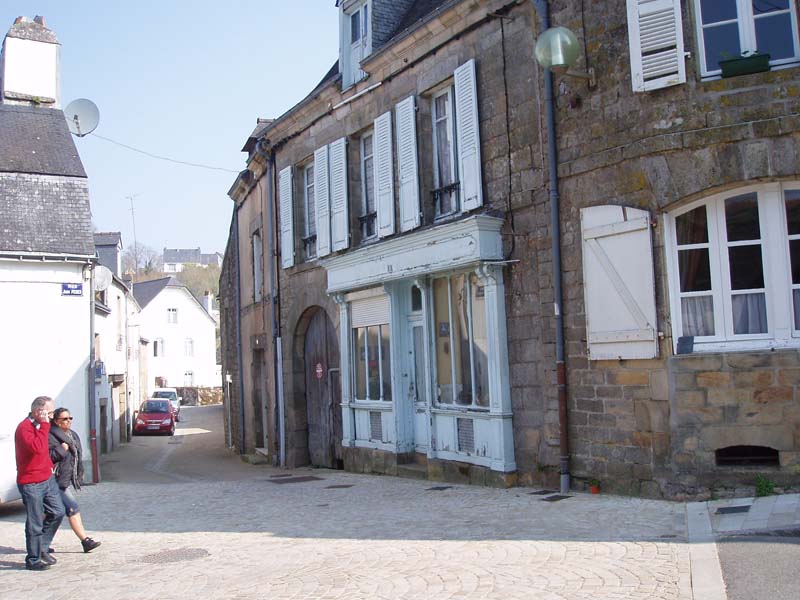
We started off looking in Brittany and the first place that caught our eye we christened The Little Shop of Horrors. This is it. It has been on the market for seven years and in that time the price has been reduced from €85,000 to €35,000. The reason for the name is that whilst on the market it has been lived in rent free by a cat, a collection of budgerigars and a young male human, so the smell and clutter can be imagined. The shop front is held in place by a coat of paint and the toilet fixtures would need approaching carefully with a flame thrower. However, if, like us, you can see past the minor "house doctor" problems there is a lot to like. It has around 100 sq metres over two floors, a large cellar, with a still - Yes, a commercial still, circa early twentieth century - and a beautiful attic with a door at the end (you can just see it in the dormer at the top of the photo) that lets in loads of sunlight, and a beautiful curved staircase that means it is usable as living space.
So after filling about seven large builders skips with rubbish and knocking out some internal partitions, we would be left with three floors of inch thick chestnut floor boards, supported on foot thick oak beams, which are let into solid granite walls. Its' been standing for three hundred years and will stay standing for another three hundred. Behind the sagging shop front are two cast iron pillars, about one hundred years old, which do the actual support work for the front of the building. So it's a simple job to create a house facade, just like they have done next door. And let's not forget the apple brandy production capability in the cellar.
We went and had a look at it for a laugh during a weeks' holiday, but actually fell in love with it. At the end of the day there were two showstoppers. No garden, just a tiny courtyard with a well, and Brittany reminded us too much of South Wales, not a good experience for us. So we are now looking further south and I went over at the end of June to have a closer look at the first half dozen on our short list, which is where, finally, we get around to the flying pig farming.
A couple of months ago, I came across a house in a small farming hamlet in Limousin where what had originally been the pig unit of the farm was for sale. No, not the house, although that is possible in a farming community, but the half a dozen pigsties surrounding it. Something about this little pig farm caught my attention and refused to let go.
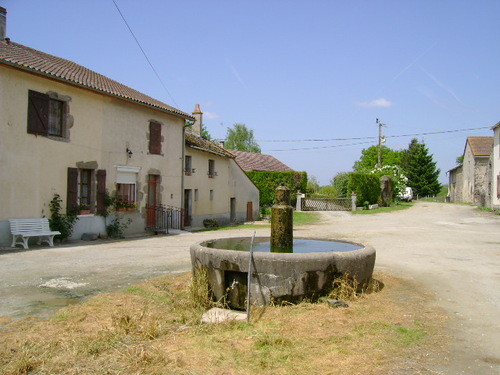
What is being sold is the main house in the centre left of the photo, the tiny cottage next to it with an attached pigsty, a barn and an old wrecked house round the back and further pigsties dotted around. There are about 300 square metres of garden laid to mud and brambles immediately behind the house and a further 1000 sq metres of rubble and tractor ruts behind the barns.
Apparently, on one day a year, pilgrims stop in the hamlet to water their donkeys at the communal trough. How idyllic! Sitting on that white bench watching the pilgrims passing, having previously spiked the water trough with some LSD tabs.
The farm was, until recently, a mixed arable and cattle farm, but the farmer has decided to retire. He will still be living there, but has sold off most of the fields and got rid of the cows. The advantage to me of living on a farm is a reliable three phase electricity supply for my woodworking machinery (they take farming very seriously in France) and as we are both up and about before any self-respecting cockerel has thought to exercise his lungs, we can just take advantage of a supply of fresh eggs.
So anyway, I drove down to the Limousin to get the pig farm out of my system and start looking at more sensible options. I used the Eurotunnel car train for the first time and was very impressed. The automatic check-in machine recognised my number plate and issued me with a boarding card after just punching the confirm button and a couple of minutes later, I was in the queue waiting to board. But the really slick thing was the other end. Waiting to get off a car ferry is an exercise in frustration as my bladder knows I can't go anywhere, so goes into full rate production. As we pulled into the station at Calais, there was an announcement that we would have to wait for safety checks before disembarking, groan, groan, but within a couple of minutes the doors swished open and we were off. Two minutes later I was making the first wrong turn on the motorway, brilliant.
The car train is more expensive than the car ferry, but it is so much quicker that it is possible to drive from Reading to the Haute Vienne in the north of Limousin in a day, so you save an overnight stay.
The journey was long, boring and expensive in tolls but, circumnavigating Paris apart, very easy. There is, by law, a rest area with toilets every twenty kilometres on French motorways and every third of fourth one has fuel and food facilities. A French estate agent told me the secret of navigating round Paris by the way and the return journey was much easier than going down. If you are heading south, ignore all signs except those which say 'Bordeaux' and going north, blinker out everything but 'Lille'. Don't look at any road number and ignore all pleas concerning the inner or outer peripheriques. Just Bordeaux or Lille. It also helps to top up the testosterone levels before starting as you will have to barge your way across lanes, but everyone does that so no one really minds.
The Limousin is beautiful, all rolling green hills, doe eyed cows and forty ton Willi Betz lorries. Willi Betz seems to be the German equivalent of Eddie Stobart and his wagons are everywhere, usually overtaking each other at a relative speed of two kilometres per hour.
I stayed in a slightly seedy but very friendly hotel in the county seat of Le Dorat. It was advertised as bi-lingual, which meant that the woman who ran it knew the English word for téléphone and the English word for hôtel, but that was about it. Still, with a bit of scouring through my little English/French dictionary I was able to get fed and watered and get shown how to lock the front door from the outside and hide the key for when I left early on the last day.
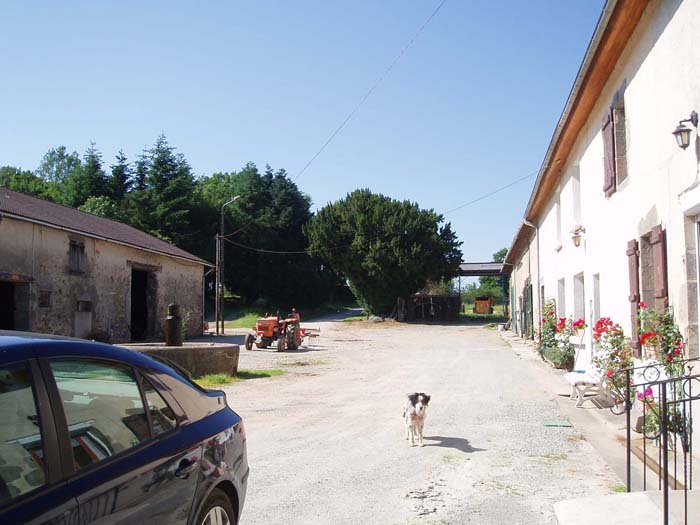
At least half of the estate agents in Limousin are British and the other half are married to Brits, so house viewing was a doddle. I looked at the pig farm first, so that I could reject it and get on with the serious business of looking for a retirement house, but there was a problem. No matter how hard I looked, I couldn't reject it. This photo shows the whole hamlet gridlocked by the estate agent's car, one of the village dogs and a tractor. What a hectic life.
The main house is just a large single living room/kitchen with three bedrooms leading off it, one of which has no windows; a long narrow bathroom formed from the old back hallway, so there is no back door, and a first floor that can only be reached from a rickety outside staircase.
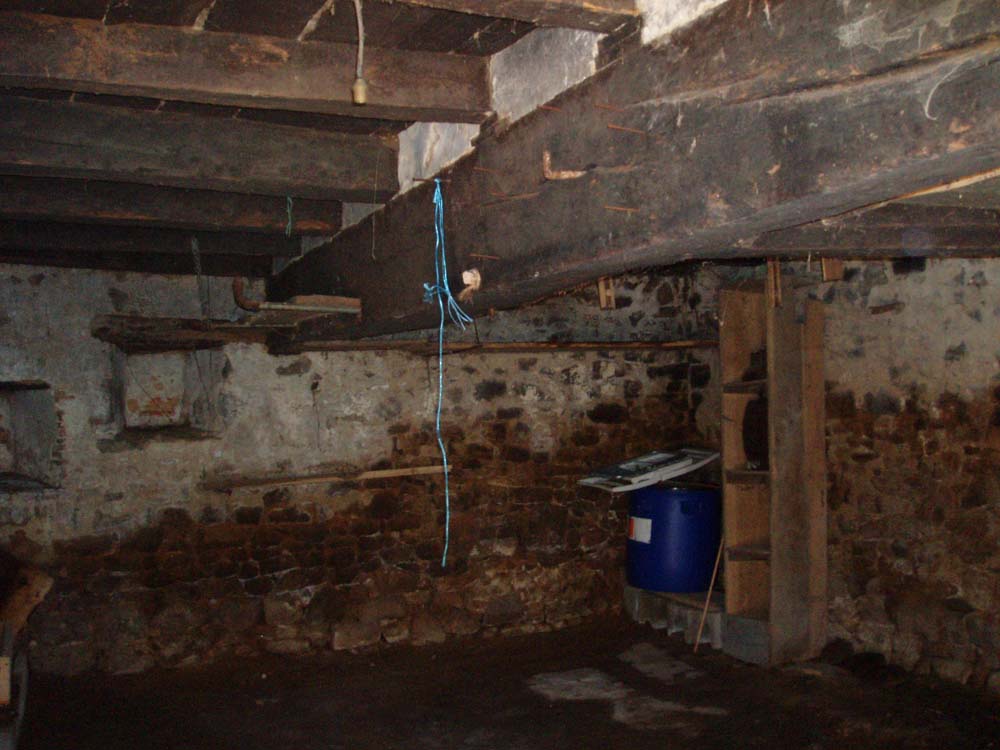
The tiny cottage joined to it has an earth floor at ground level (described as a cellar in the advert), with a tile floored loft above. Yes, I know it is unusual for a cellar to have a loft, but this is rural France. It is not unusual to find tiles (tomettes) on the floor of a loft in France as they do provide good insulation. The barn, which used to be the farm forge and so has a big old fireplace, will make a nice workshop, but the spare house would be best left for the birds, bats and chickens.

The inside of the main house is in the usual state of dilapidation, which for us is perfect as it means that no one has yet renovated (ruined) the original features, so we can ruin them ourselves, nor has the kitchen been filled up from Ikea.
This photo shows part of the main living room/kitchen in which you can see a feature common to many rural French houses. There is a large old fireplace -- certainly big enough to house a central heating boiler -- but the boiler has been installed right out in the room, with a flue-pipe snaking its way into the chimney. I guess if you can afford a central heating boiler you want it where the neighbours can clearly see it.
We would move the boiler to the cellar next door, where the oil feed tank already sits, and install a wood burner in the fireplace, once we have scraped it back to the granite. Seven million homes in France are heated entirely by wood, but as 25% of the country is still covered in forest, there will be enough for us. Most local authorities give you a free wood ration, as long as you chop it down and haul it away yourself.
Here is an old rhyme about firewood:
Beechwood fires are bright and clear If the logs are kept a year. Chestnut's only good, they say, If for long 'tis laid away. But Ash new or Ash old Is fit for a queen with crown of gold. Birch and fir logs burn too fast Blaze up bright and do not last. It is by the Irish said Hawthorn bakes the sweetest bread. Elm wood burns like churchyard mould, E' en the very flames are cold. But Ash green or Ash brown Is fit for a queen with golden crown. Poplar gives a bitter smoke, Fills your eyes and makes you choke. Apple wood will scent your room With an incense like perfume. Oaken logs, if dry and old. Keep away the winter's cold. But Ash wet or Ash dry A king shall warm his slippers by.
So the humble ash that gardeners scorn as a weed is perfect for heating our home. Of course, all wood should be stored for at least a year before using, so that its moisture content falls enough to ensure complete combustion. Then it has very few harmful emissions, particularly if burnt in a modern closed heater. Oh, and don't store it piled up against the house wall, or you will have very damp walls. Treat it as though you were drying it for furniture building, which is easier if you have a number of spare pig pens.
The other minor decorating job needed is to install a sewage system. The house was lived in by the farmer's parents, but, being a working farm, sewage from the house ran straight into the slurry pit along with all the cow shit. I have therefore been researching micro-stations d' epuration, which are miniature sewage treatment plants. The reason for favouring this approach, rather than the usual septic tank, is that the output is pure enough to discharge straight into a stream, so we could store it along with rainwater for watering the potager (that's vegetable garden to you).
Anyway, after spending two days looking at more normal and sensible properties and talking it over with Cami, we made an offer for the pig farm and it has been accepted. It could all still fall through, but we could own it by October 2010, install the sewage station over the winter and start renovating next spring. The intention is to move in either Autumn 2011 or Spring 2012 and let out our house in Reading until we decide whether to move permanently.
If someone had told me a couple of years ago that we would own a pig farm, you can guess what I would have said. Well, the pigs are flying tonight and we will be farming them. We have spent all our money and made tons of work to look forward to. Of course, if we were sensible we would buy a Porsche, take some world cruises and die gracefully in Reading. But for us, that way lies madness and I think I still have one house renovation left in me. We shall see.
Finally, a working garden! Well almost
It looks as though we are going to have a reasonable crop of vegetables and fruit this year and, without any evidence to back it up, I have a hunch that the cold snap in winter helped.
I have left root crops alone and concentrated on tomatoes, beans, courgettes and pumpkins in the way of veg and for fruit; gooseberries, raspberries, cherries, plums, pears and, of course, our old apple trees, which continue to give us bumper, if somewhat maggoty, crops and our much travelled fig tree.
I have standardised on Sungold and Black Russian for cherry tomatoes, which I use a lot of in salads and am growing some of them in the greenhouse and some outside. There is no noticeable difference in plant development between the two environments thus far, although there are signs that the greenhouse plants are beginning to stretch their legs.

The transplanted cherry trees have done splendidly, as can be seen in this photo and the fruit cage has prevented the worst of the previous bird devastation; but not all. There has been one troublesome Thrush that managed to find a tiny gap at the bottom of the netting and had a few cherries away before my neighbour spotted him trying to find a way out. Once I had plugged that gap, a heavy bird must have sat on the top netting and dragged one edge slightly away from the side netting. Mr Thrush was in like Flint, but I spotted him before further damage was done. Double the number of clips holding the top onto the sides seems to have closed that avenue and so far, there have been no further raids, but I am waiting for hin to find a way to open the door. The moral is that fruit cages have to be built like maximum security jails, even to the extent of being sunk into the ground to keep out tunnelling Thrushes, who have clearly been watching back to back episodes of Prison Break.
During the winter, the old plum tree that provided shade for the bench at the bottom of the garden was broken by the huge weight of snow on it.
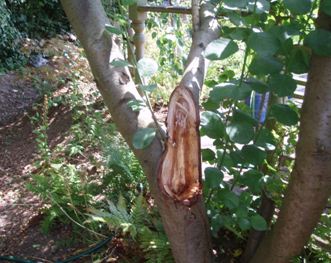
There were a couple of big horizontal branches reaching out over the seat and these were ripped so badly where they joined the trunk that part of the trunk was torn away, as you can see in the photo. I sawed off the broken bits and fully expected to have to dig the old tree out when it succumbed. Come spring and away it went, sprouting new growth everywhere and now looks as though it will give us a reasonable crop. It always inspires me when I see an old tree recover from such an ugly wound. There's lots of life in us old trees yet.
The language of luv
The other day I was seeing how far I could get through an article in a French DIY magazine by just looking at the words I didn't understand (most of them) and trying to find English words that looked or sounded as though they came from the same root and extrapolating the meaning. A check with the text translator on dictionary.com showed that I had got about a 10% hit rate. Not great, but a small step forward in learning the language of my maybe to be adopted home.
All this started me musing on how English would change as it slowly becomes the lingua Franca of the world. Lingua Franca is Latin for a common language used by speakers of different languages and literally means Frankish or French language, so English is becoming the French language of the world. You have to go back to the origin of the phrase to understand how such linguistic nonsense comes about. There was a language spoken by Europeans on the eastern Mediterranean coast that was a mixture of Italian, Provençal, French, Spanish, Arabic, Greek, and Turkish, Arabs called all Europeans Franks, so they knew this creole as the language of the Franks, hence lingua Franca in the Latin of the monks that translated Arabic
This sort of thing has been going on since the first cavemen dropped a rock on his toe and said "?@!!!", but English has long been in the forefront of language mutation, simply because it has been in contact with so many different languages.
English is in the Germanic branch of the Indo-European language. Currently there are some 53 Germanic languages and the most popular are German, English, Dutch, Afrikaans, Norwegian, Danish, Swedish, Icelandic and Faroese
One thing that is common to all Germanic languages is a hardening of some consonants from the proto-European, such as d becoming t in words like ten (the Latin root is decem, from where we get the word decimal). This and other sound changes make Germanic languages easier to hear as there is far less inflection than in Romance languages like Spanish and French. Speak each and every letter in a word and you won't go too far wrong. These simple sounding languages are called analytic as opposed to inflective, which simply means that we use function words rather than inflections to express syntactic relationships, "more often" for instance, rather than "oftener".
That doesn't necessarily make such languages easier to learn, but does mean that you are less likely to make the social gaffes that are possible in spoken Chinese for instance. Nor does it make it easier for speakers of one Germanic language to understand speakers of another, although it is said that English can be understood in the province of Friesland, in the north of Holland.
"Rye bread, butter and green cheese is good English and good Frysk" -- English
"Brea, bûter en greine tsiis is goed Ingelsk en goed Frysk" - Frysk
Doesn't sound much worse than trying to understand a Geordie.
The Romans gave us a start in language mutation with a clutch of Latin words and constructs. Then a lot of different Germanic speakers bloodily invaded or peacefully settled these isles, so we picked up words from all over Europe and took on the simplified sounds of German. Finally the French hit the beach at Hastings in 1066 and gave us a whole slew of new words but, thankfully, did not get us back to speaking through our noses.
Soon after that, we started exporting language as well as importing it. A trickle at first: Excursions to Jerusalem in the middle-ages; Rampaging through small parts of western France; But once we got the hang of it, we went into it wholesale. We borrowed hundreds of words from all over the world and, in return, forced everyone we met to speak English. It may have seemed cruel at the time, but just how big a star do you think Lady Gaga would be today if no one outside of Scunthorpe could understand her.
It was popular culture that started the dominance of English today. American pop songs from the nineteen fifties through to today, with a few quaint exceptions like Jane Birkin's "Je t' aime...moi non plus" and the Doris Day chorus of "Que sera sera", are sung in English and kids all over the world buy them by the container-ship load. Then, in the nineties came the internet and English exploded everywhere.
English is now the second most spoken native language in the world after Mandarin, having overtaken Spanish some time ago. It is, by far, the most popular second language, with Hindi and Spanish in second and third.
For me, the real signpost to the ability of English to swamp all other languages before the end of this century is the inroads it has made into French. When I first toured France in the early sixties with some mates on motorbikes, no one spoke English, nor made any effort to understand broken French. I learned, when asking for a beer, just to repeat "une bièr s' il vous plait" as many times as necessary, with a subtly different intonation each time. Eventually, for no reason that I could fathom, one of my utterances would cause a flash of recognition in the eyes of the waiter. Now everyone under forty seems to want to practice their English, English words appear all over adverts and magazine headlines and even very ancient waiters seem to understand my request for a beer, maybe because I now usually ask for "une pression", which doesn't depend on such dramatic nasal contortions. Pression, by the way, means draught or draft beer, depending on whether you are English or American, a point to which I will return.
There is a committee at the Academie Francaise whose job it is to stand guard over the French language and make sure it is not sullied with foreign imports. They deliberated for years before allowing Biftek (Beefsteak); but in the twenty first century they have been swamped and have virtually given up the ghost. Apparently, the French now conjugate the verb to babysit, just like any other French verb:
Je babysit, tu babysit, il babysit, elle babysit and, of course, nous babysiteron and vous babysiterez.
If you want to show agreement, then it is just as acceptable now to say "cool" as it is the more traditional "d' accord".
I have observed the same merging of English into the local language in Germany, Spain and Italy and I am sure it is going on equally rapidly over the rest of Europe. The language already had a strong foothold in the Indian sub-continent and the growth of IT support organisations there can only increase that. Finally, as China becoms the factory of the world, it is also becoming bi-lingual, which brings me on to this story which I picked up somewhere on the web. A group of international businessmen were using English to conduct their business, or maybe chat about the latest cover of FHM. The only person who had difficulty understanding them was an Englishman. Urban myth? Maybe, you can see how it could be true.
In all of this musing on the world domination of our language, I have been using the term English, for that is the official name of the language, but English is no longer, if it ever was, a single language. There was the start of a major division in the eighteenth century between Britain and North America. First, diverging dialects, followed by changes to spelling and word order. Fortunately, these changes, probably due to German and Scandinavian influences, simplified and regularised the language rather than turning it, some neighbourhoods of Los Angeles aside, into an opaque creole.
It must be much easier for a Chinese factory worker to learn American English than the British variety. As we saw earlier, you ask for a draft beer in North America, which is more phonetic than draught beer. In British, the 'ught' is pronounced 'aft' in draught, but 'out' in drought, a hangover from a more inflective language.
So, to the original question; how will English change as it becomes the world language? Hopefully the core language will continue to simplify and regularise. The Middle English neahgebur (a farmer who is nigh) has become neighbour and simplified slightly to neighbor. It now needs to morph into nayber to finish the job off.
"Mi nayber and i workt into wurk." -- 22nd century Universal English, or Chinglish as it is popularly known.
However, on top of the core will be even more dialects than there are now, so you will still be able to tell whether someone comes from Trinidad, Toronto, Timbuktu or Tooting. Done yer jus luv it.
Last updated 12 July 2010